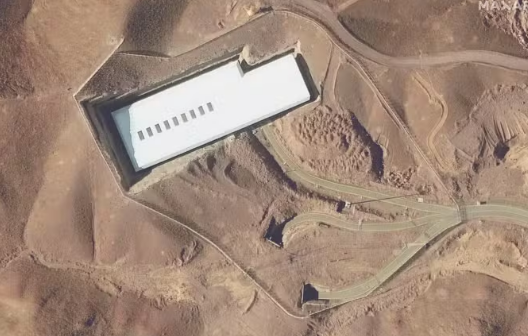Trump says US carried out ‘very successful attack’ on three Iran nuclear sites
Reactions on US attacks on Iran
Guterres says he’s ‘gravely alarmed’ by U.S. strikes on nuclear sites in Iran
Washington: President Donald Trump said Saturday the US military has carried out a “very successful attack” on three Iranian nuclear sites, including the underground uranium enrichment facility at Fordo.
“We have completed our very successful attack on the three Nuclear sites in Iran, including Fordow, Natanz, and Esfahan,” Trump said in a post on his Truth Social platform.
“A full payload of BOMBS was dropped on the primary site, Fordow.”
Trump added that “all planes are safely on their way home. Congratulations to our great American Warriors.”
Trump’s announcement came just two days after he said he would decide “within two weeks” whether to join key ally Israel in attacking Iran.

Earlier on Saturday, there were reports that US B-2 bombers — which carry so-called “bunker buster” bombs — were headed out of the United States.
Trump did not say what kind of US planes or munitions were involved.
Tehran had threatened reprisals on US forces in the Middle East if Trump attacked but the US president called for “peace.”
“There is not another military in the World that could have done this. NOW IS THE TIME FOR PEACE!” he said.
Reactions on US attacks on Iran
Iran’s Foreign Minister Abbas Araghchi on Sunday condemned the US attacks as “outrageous” and said his country has a right to defend its sovereignty.
“The events this morning are outrageous and will have everlasting consequences,” he posted on X, adding that the attacks were “lawless and criminal” behavior.
“In accordance with the UN Charter and its provisions allowing a legitimate response in self-defense, Iran reserves all options to defend its sovereignty, interest, and people,” the foreign minister said.
Iran’s atomic energy organization also called the US attacks “a barbaric act that violates international law.”
“The Atomic Energy Organization of Iran assures the great nation of Iran… it will not let the path of development of this national industry (nuclear), which is the result of the blood of nuclear martyrs, be stopped,” it said in a statement published by state media.
Palestinian militant group Hamas condemned the “blatant US aggression against the territory and sovereignty of the Islamic Republic of Iran.”
“This brutal aggression is a dangerous escalation,” Hamas said, calling the attack “a flagrant violation of international law, and a direct threat to international peace and security.”
UN Secretary-General Antonio Guterres called the strikes a “dangerous escalation in a region already on the edge.”
“At this perilous hour, it is critical to avoid a spiral of chaos,” Guterres said in a statement. “There is no military solution. The only path forward is diplomacy. The only hope is peace.”
The top Democrat in the US House of Representatives accused Trump of pushing the United States toward war.
“President Trump misled the country about his intentions, failed to seek congressional authorization for the use of military force and risks American entanglement in a potentially disastrous war in the Middle East,” Congressman Hakeem Jeffries said in a statement.
“Donald Trump shoulders complete and total responsibility for any adverse consequences that flow from his unilateral military action.”
Did the US strikes succeed, and how will Iran respond?
The United States’ strikes Sunday on Iranian nuclear sites raised two major questions: how effective were they, and what will Iran do next?
US President Donald Trump said the air raids “totally obliterated” the main nuclear sites, calling them a “spectacular military success”.
So far, Tehran has given little away about its response, although Foreign Minister Abbas Araghchi said the United States had “crossed a very big red line”.
The United States targeted Iran’s three main nuclear sites including Fordo, a uranium enrichment facility buried 90 metres (about 300 feet) underground.
US Defense Secretary Pete Hegseth said the strikes “devastated the Iranian nuclear programme”.
The extent of the damage has not been confirmed, but there is speculation nuclear material had already been moved away.
Heloise Fayet, a nuclear expert at the Institut Francais des Relations Internationales, said satellite images showing activity around Fordo “suggest enriched uranium stock may therefore have been transferred to sites not monitored by the IAEA (International Atomic Energy Agency)”.
“We previously had knowledge, albeit imperfect, of the programme thanks to the agency’s inspections; now no inspections are possible,” she told AFP.
“As for Iran’s technical expertise, it cannot be destroyed, knowing that thousands of people have participated in Iran’s nuclear programme.”
Andreas Krieg, a senior lecturer at King’s College London, called the US action a “high-risk operation that delivers unpredictable outcomes”, given the facility was deep underground.
“Trump has been using OSINT (open-source intelligence) accounts to say Fordo is gone while the Iranians claim there is only surface-level destruction.”
Ali Vaez, Iran project director for the International Crisis Group, said destroying Fordo “won’t necessarily end Iran’s nuclear programme.
“Tehran has produced hundreds of advanced centrifuges in the past few years that are stored in unknown locations,” he said.
According to Krieg, Iran will seek a “calibrated response — loud enough to resonate, but measured enough to contain”.
Michael A. Horowitz, a geopolitics and security analyst, said its options included attacking US assets, closing the Strait of Hormuz — a vital conduit for the world oil trade — or even attacking energy facilities in the Gulf, which hosts several US military bases.
“None of those are good options that achieve anything — this is mostly about saving face,” he posted on X.
However, Horowitz said there were other ways to respond, including a limited retaliation against the US before returning to strikes against Israel and finally negotiating a settlement.
The Iranian government now realises its very existence is at stake, said Renad Mansour, senior research fellow at the Chatham House think-tank, casting it back to the days of the 1980-1988 Iran-Iraq war.
“It’s survival mode,” he said, predicting “more violence” in the short-term with the prospect of a “managed de-escalation” and eventual negotiations.
Hamidreza Azizi, visiting fellow at the German Institute for International and Security Affairs, said Iran might allow Trump a “symbolic win” and retaliate against Israeli targets instead.
“This keeps Washington out of the war while intensifying pressure on Tel Aviv. The risk of drawing the US further in would now rest on Trump’s next move,” he posted on X.
“If Trump continues to strike Iran without new provocation, it looks more like going to war on Israel’s behalf. That’s politically costly, given domestic opposition to war with Iran.”
Meanwhile, Iran could deny knowledge of what happened to its enriched uranium, avoiding IAEA inspections, and later leave the Nuclear Non-Profiferation Treaty.
“Trump may have scored a tactical win, but if Iran plays this smart, they hand him a political grenade,” Azizi wrote. “All while shifting the nuclear game into murkier, more dangerous territory.”
Iran executes man convicted of being spy for Israel: judiciary
Iran on Sunday executed a man convicted of being an agent for Israel’s Mossad spy service, the judiciary said, as fighting raged between the two foes for a 10th day.
“Majid Mosayebi… was hanged this morning after going through the full process of criminal procedure and after his sentence was confirmed by the Supreme Court,” the judiciary’s Mizan Online website said.
Mosayebi was accused of seeking to provide “sensitive information… to Mossad”.
Iran has carried out multiple arrests of people suspected of spying for Israel since its attack on June 13.
Later Sunday, judiciary spokesman Asghar Jahangir said three people had been arrested in the western province of Kermanshah on allegations of espionage.
The arrests were made thanks to “the rapid presence of the population and their assistance to the intelligence services, law enforcement agencies and judicial officers”, he said.
“One of them is said to be a national of a European country,” he added, quoted by Mizan.
Iran is the world’s second most prolific executioner after China, according to human rights groups including Amnesty International.
Guterres says he’s ‘gravely alarmed’ by U.S. strikes on nuclear sites in Iran
In a starkly worded statement, UN Secretary-General Antonio Guterres, said he is “gravely alarmed by the use of force by the United States against Iran.”
“This is a dangerous escalation in a region already on the edge — and a direct threat to international peace and security,” the UN chief said in a post on X.
Earlier, multiple news outlets said the U.S. military struck three nuclear sites in Iran early Sunday, directly joining Israel ’s war aimed at decapitating the Islamic Republic’s nuclear programme.
The decision to directly involve the U.S. comes after more than a week of strikes by Israel on Iran that have moved to systematically eradicate the country’s air defences and offensive missile capabilities, while damaging its nuclear enrichment facilities.
But U.S. and Israeli officials have said that American stealth bombers and a 30,000-pound bunker buster bomb they alone can carry could destroy the heavily-fortified sites connected to the Iranian nuclear programme buried deep underground.
President Donald Trump was the first to disclose the strikes. There was no immediate acknowledgment from the Iranian government. But Iran’s state-run IRNA news agency reported that attacks targeted the country’s Fordo, Isfahan and Natanz nuclear sites. The agency did not elaborate.
In his statement, the UN secretary-general also warned of the risk of the conflict quickly getting “out of control — with catastrophic consequences for civilians, the region, and the world.”
Guterres urged U.N. member nations to “de-escalate and to uphold their obligations under the UN Charter and other rules of international law.”
“At this perilous hour, it is critical to avoid a spiral of chaos,” he said.
“There is no military solution. The only path forward is diplomacy. The only hope is peace,” the UN chief added.
In an address from the White House, Trump said Iran must make peace or future attacks will be “far greater”
He called the strikes on Fordo and two other nuclear sites a “spectacular military success”
“Iran’s key nuclear enrichment facilities have been completely and totally obliterated. Iran, the bully of the Middle East, must now make peace,” Trump said in an address to the nation from the East Room of the White House.
His announcement came shortly after the president said he would wait before making a decision about U.S. involvement.
“A full payload of BOMBS was dropped on the primary site, Fordow. All planes are safely on their way home. Congratulations to our great American Warriors.
There is not another military in the World that could have done this. NOW IS THE TIME FOR PEACE! Thank you for your attention to this matter,” Trump posted on Truth Social.
Iranian state media says part of the Fordo site was “attacked by enemy strikes”, however authorities are yet to confirm the extent of damage.



